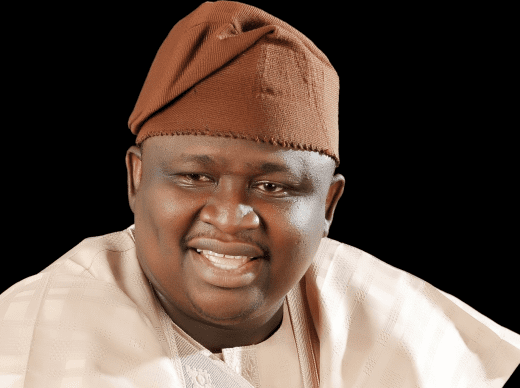
Ogun: Measured steps towards 2027
By Kunle Somorin
Although the current reality is pushing up the Senator representing Ogun West Senatorial District in the National Assembly, Solomon Olamilekan Yayi, as the candidate to beat in the scheme to replace incumbent Dapo Abiodun as the governor of Ogun State, the ensuing reality points to a grand scheme to give the Chairman, Senate Committee on Appropriation, a run for his popularity and money.
Understandably, the highly politically savvy lawmaker is not taking matters lying low. At the annual New Year thanksgiving service held at the Unity Cathedral of the Redeemed Christian Church of God, Ogun Province 7, Ilaro in Yewa South local government area of Ogun State, where he donated N50 million to the ongoing construction project, Yayi, as he is fondly called by admirers, tactfully responded, against his known sophistry, over his touted ambition when he told curious journalists: “I don’t think it is time for that now, we are still involved in trying to bring back the dividends of democracy to the people as senator elected for Ogun West. What we are here to do today is to appreciate the Almighty God for his support in the past years and to also celebrate the new year with my people for their support and cooperation as well because they are the ones who put me in this office.
“So, in future, we can start talking about that when the time is ripe to know if I am going forward or I am staying where I am, the future will determine all of that.” An ardent believer in destiny enthused that while 2007 is shrouded in the belly of providence and for the Almighty to decide, he would scrupulously adhere to his delivery on his campaign promises to the good people of Ogun West and that “the future would determine his next political move.” Meanwhile, the Awori people in his constituency, have overwhelmingly foreclosed his return to the Senate for the fourth time, with aspirants already declaring their intentions to take over. The permutations or is it consensus is that Yayi will become the next governor all things being equal and thus it is a foregone conclusion.
While who succeeds Prince Dapo Abiodun may be in the bowel of history and for the electorate to decide, those who want to succeed him as he bows out of office on his 67th birthday are scheming behind closed and open doors, recruiting all manners of people, groups and cartels across the senatorial districts, deploying subterfuge in the names of empowerment programmes and palliatives, and garnering chieftaincy titles to woo sections of the traditional institutions and the pliable electorate to their sides. Prince Abiodun himself, like other party leaders, traditional rulers, and critical stakeholders within and outside the state, by now are being inundated by audacious blackmail, gimmickry, and other arm-twisting tactics by those interested in returning the governor to his Heyden Petroleum or a higher office after Oke Mosan.
The discussion surrounding the 2027 Ogun State governorship race has gone a notch higher with various ethnic groups, except the Remos, vying for the state’s number one slot. The Ijebus argue that they have been historically overlooked for the governorship position since Chief Bisi Onabanjo, who they claim was the only Ijebu man to be elected governor in the state. Now the Remo are not their kinsmen, even when Ojude Oba Festivals unite them. No doubt, the major headache for the other aspirants is the Yayi phenomenon. The Ijebus claim they have been denied the governorship position in Ogun State since the start of the Fourth Republic. The distinction between the Remos and Ijebus only exists in the polaristic minds of politicians, anyway. While some political figures, like Senator Solomon Adeola, believe it’s too early to discuss their ambitions publicly, the intrigues continue over which group will get the tickets of the ruling party and the main opposition parties as the elections approach.
For someone like Otunba Deji Osibogun, the revered stance of the paramount ruler of Ijebuland, Oba S.K Adetona Ogbagba II, that since 1999, it had been time for a Yewa man to become our Governor, makes no sense to them. For historical dilettantes and connoisseurs of the state political history, power has always alternated between both the Ijebu and Egba. Oba Adetona actually wrote in his autobiography that “in the interest of fairness and going by the rotation the politicians clamoured for, the next governor should be from Yewa.” People like Osibogun cared no hoot about what the Orisa Ijebu meeting where he called by the respected monarch “in favour of having a Yewa man emerge as the next governor of Ogun State.” Although Kabiyesi had no Yewa son or daughter in mind, because it was not for him to choose, one is tempted to say there is one who now stands heads and shoulders higher than his peers this time around.
While Senator Solomon Adeola asserts that it’s premature to discuss the 2027 governorship race, there’s a growing cacophony of voices regarding which ethnic group should produce the next governor. Political dynamics in Ogun State are complex, reflecting regional interests and shifting power balances. Discussions around the 2027 elections are prompting various stakeholders to evaluate their political strategies. But it is uncertain if the evolving political landscape could be hijacked or even infiltrated by newcomers and even existing political figures to redefine.
The Egba, though, have lower visibility in the governance structure of the State, have three federal ministers: Wale Edun (Finance); Jumoke Oduwole (Investment, Trade and Industry); and Bosun Tijani (Communications and Digital Economy). What is without doubt is that of the five democratic governors the state has had, both Chief Olusegun Osoba and Senator Ibikunle Amosun have noble mentions. Within the Egba l’okan arrangement, there seems to have been no unity; while people like Chief Abdulhakeem Mustapha are for purely Egbas of male descent – and they are many eligible sons and daughters in this category, young Turks like Prof. Yemi Oke use the neo-liberal taxonomy as someone who has either of his parents (dad or mum) as having Egba ancestry. The snag is that it has led to recrimination with suspension and counter-suspension, indicating that things are falling apart within that framework, simply because Yayi’s mother was a Kemta Odutolu woman from Ogun Central. But the fazed zealotry of some says those with the latter perspective are Senator Adeola’s apologists, adding that the other camp’s certification of Egba indigeneship of Yayi is also unacceptable. For them, as the Olu of Ilaro has stated that the senator is their son in Yewaland, no similar pronouncement has been made by the Alake and Paramount Ruler of Egbaland or any other Oba in Egbaland!
The campaign for DA’s successor is becoming more interesting and intriguing daily. A clear push for inclusion is an inescapable central theme in their campaigns. Perhaps, some of these groups want the deputy governor’s slots. Yayi’s cautious move is equally understandable and politically correct. His choice of focusing instead on current responsibilities and community engagement is salutary, and he knows that candidates forming alliances with influential groups and stakeholders to bolster their chances are part of the democratic enterprise. Whether as attention-seekers, grandstanders or wet-blankets Yayi is being put on the spot, tipping him on his toes, so that he does not become complacent. Building a broad base of support is much more reasonable than referencing historical governance patterns, building trust and demonstrating commitment to the community, and utilising media platforms to communicate their visions and manage public perceptions and address concerns or criticisms that arise during the campaign are universally accepted frames which endears Yayi to the grassroots. But overall, the strategies to deliver Oke Mosan to any of the gladiators must reflect a blend of traditional political manoeuvring and a responsive approach to the evolving political landscape. Sadly, the ethnic card is being overplayed and fast becoming a desideratum for who takes over from Dapo Abiodun in a state known for being the primus-inter-pares among states.
The conclusion to draw from this unfolding drama is that leadership is not just about ambition, but about service, timing, and the ability to navigate complex social landscapes. As candidates form alliances, engage with communities, and communicate their visions, they must remember that true leadership is rooted in the trust and support of the people. The evolving political landscape in Ogun State serves as a reminder that no one should be taken for granted, and that the path to leadership is paved with both challenges and opportunities.
• Somorin, a political communication scholar, writes from Crescent University, Abeokuta




